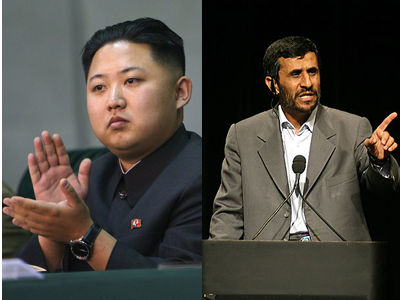Washington’s Dead Policies Toward Pyongyang and Tehran
It is past time to bury the rotting carcasses of Washington’s ineffectual policies toward North Korea and Iran.
 In the next week, the Obama administration could face its toughest test yet in handling Iran and North Korea’s quest for nuclear capabilities. If Washington continues to pursue the same sterile policies toward these distasteful regimes, little progress will be made. Diplomacy is still a workable option in each case, but the administration must seek to establish diplomatic relations with Tehran and Pyongyang, even though such a wise goal will be politically controversial.
In the next week, the Obama administration could face its toughest test yet in handling Iran and North Korea’s quest for nuclear capabilities. If Washington continues to pursue the same sterile policies toward these distasteful regimes, little progress will be made. Diplomacy is still a workable option in each case, but the administration must seek to establish diplomatic relations with Tehran and Pyongyang, even though such a wise goal will be politically controversial.
North Korea seems to be on the brink of conducting a long-range missile test thinly disguised as a satellite launch. And according to the Associated Press, South Korean intelligence officials claim the North is preparing for a third nuclear test. The P5+1 talks with Iran are now set to begin April 14 in Istanbul, but tensions remain high.
The developments on the Korean peninsula are particularly worrisome, if unsurprising. They confirm that Washington’s policy of threatening the North Korean regime with stark international isolation if it does not abandon its ballistic-missile and nuclear-weapons program is increasingly an exercise in futility. Most experts believe that Pyongyang already has enough fissile material for four to six weapons and may have already built two or three such weapons. And the North Korean missile-development effort has gone forward, despite periodic setbacks. The effort to isolate Pyongyang has fallen far short of Washington’s goal—with China especially continuing to give Kim Jong-un’s government the food and energy aid that it needs to stay afloat.
U.S. policy toward Iran has not fared much better. Despite getting the international community to impose ever tighter economic sanctions, Tehran’s nuclear program also seems to have made steady progress. Indeed, the sanctions system is notable for its leakage. Frustrated political leaders and pundits in the United States and Israel mutter darkly about resorting to military action to halt Tehran’s march toward a nuclear capability. But the risks of waging a counterproliferation war against Iran are obvious, worrisome and potentially catastrophic.
The nineteenth-century British statesman Lord Salisbury once observed that “the commonest error in politics is clinging to the carcasses of dead policies.” The sad state of U.S. efforts to prevent Pyongyang and Tehran from joining the ranks of nuclear-weapons states is Exhibit A in support of Salisbury’s observation. U.S. policy makers have doggedly pursued their attempts to isolate the two “rogue” regimes for decades—with almost no evidence of success. Washington now faces the prospect of utterly bankrupt policies on both fronts. Indeed, the United States risks ending up with the worst possible combination—the emergence of two new nuclear powers with whom Washington has no formal relations and unrelentingly hostile informal relations. That combination is both futile and dangerous.
Wise statesmen learn to abandon obsolete or unworkable policies. President Richard Nixon did so with his opening to China in 1972, and President Bill Clinton did so with his normalization of diplomatic and economic relations with Vietnam in the late 1990s. The results have been clearly positive in both cases, even though the regimes in Beijing and Hanoi are still highly authoritarian and engage in some repulsive actions.
The Obama administration needs to show the same judgment and courage by making a sustained effort at the highest level to establish something at least resembling a normal relationship with Pyongyang and Tehran. It is well past time to bury the rotting carcasses of Washington’s ineffectual policies toward those two governments.
Image, Kim Jong-un: petersnoopy
Image: Mahmoud Ahmadinejad: Daniella Zalcman
